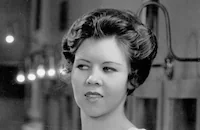Ada

Brief Synopsis
Cast & Crew
Daniel Mann
Susan Hayward
Dean Martin
Wilfrid Hyde-white
Ralph Meeker
Martin Balsam
Film Details
Technical Specs

Synopsis
While campaigning for the governorship of a southern state, Bo Gillis, a politician given to folksy speeches and guitar playing, falls in love with and marries Ada, a reformed prostitute. The young woman's dubious background alarms both Bo's loyal press agent, Steve Jackson, and his political adviser, Sylvester Marin. Ada proves to be an eager and resourceful campaigner; and once Bo is in office, she tries to convince him that the mild-mannered Marin is a ruthless opportunist, supporting Bo only because it suits his own interests. Even though Marin viciously blackmails the honest lieutenant governor into resigning, Bo refuses to see Marin for what he really is. Ada, anxious to succeed on her own, plays up to Marin and is appointed the new lieutenant governor. A short time later, Bo is badly injured in an automobile explosion--the direct result of his failure to accept all of Marin's suggestions. Bo accuses Ada of siding with Marin, and she decides to prove him wrong. After being sworn in as acting governor because of Bo's incapacitation, she openly defies Marin by supporting a series of reform bills introduced by Bo. Marin, assisted by his corrupt police chief, Colonel Yancey, retaliates by threatening to make public a tape recording that could destroy Ada's reputation; but Bo is released from the hospital in time to defend his wife. Following his speech in the state capitol, the reform legislation is passed, and he and Ada are reunited.

Director

Daniel Mann
Cast

Susan Hayward

Dean Martin

Wilfrid Hyde-white

Ralph Meeker

Martin Balsam
Frank Maxwell
Connie Sawyer
Ford Rainey
Charles Watts

Larry Gates
Robert F. Simon
William Zuckert

Mary Treen
Crew
Robert Armbruster
George W. Davis
William Driskill
Wally Fowler
Henry Grace
Charles K. Hagedon
Al Jennings
Conrad Kahn
Bronislau Kaper
Mary Keats
Lee Leblanc
Michael Messinger
Jack Mills
Franklin Milton
Warren Roberts
Rita Roland
Helen Rose
Joseph Ruttenberg
Arthur Sheekman
William Tuttle
Lawrence Weingarten
Ralph E. Winters

Videos
Movie Clip



Trailer
Hosted Intro
Film Details
Technical Specs

Articles
Ada
Ada was based on a 1959 novel by Wirt Williams that, in turn, was inspired by the career of Louisiana's Governor Jimmie Davis, who had recently been re-elected. Davis had been floated for governor in 1944 by Huey Long's political machine and had charmed voters at rallies with his performance of "You Are My Sunshine." For the film, Martin had an original song to croon, "May the Good Lord Bless You Real Good."
The film was put into production to capitalize on the recent success of such steamy best-sellers as Peyton Place (1957) and take advantage of the screen's new permissiveness. In this case, the selling point was Hayward's role as a prostitute (still referred to in veiled terms in the script) who marries Martin after a drunken night of partying, becomes his lieutenant governor by some strange machination, then reforms the state when her husband is sidelined by an automobile accident.
The part seemed tailor-made for Hayward, who was floundering in search of suitable vehicles after her Oscar® win for I Want to Live! in 1958. A recent attempt at comedy in The Marriage-Go-Round (1961) had fallen flat and she was no longer being offered the kind of gritty dramatic vehicles that had brought her to stardom. Since Ada was helmed by her favorite director, Daniel Mann -- who, with producer Lawrence Weingarten had shepherded her to an Oscar® nomination for I'll Cry Tomorrow (1955) -- she thought she had another winner on her hands. Moreover, the stage-trained Mann had already directed three Oscar® winning performances - Shirley Booth's in Come Back, Little Sheba (1952), Anna Magnani's in The Rose Tattoo (1955 - Hayward's competition at the Oscars® that year) and Elizabeth Taylor's in Butterfield 8 (1960) - making a meaty role like this seem a strong career choice.
In this case, however, appearances were deceiving. With a script by comedy specialist Arthur Sheekman and television writer William Driskill and a questionable supporting performance by British actor Wilfrid Hyde-White, whose Southern accent kept slipping, Ada was uneven at best. For her part, Hayward was more interested in her happy marriage to Georgia businessman Floyd Eaton Chalkley than in fighting to make a great picture. Nor did her lack of rapport with Martin help. She never warmed to her co-star (though, in truth, she rarely warmed to any of her co-stars), deeming him "vulgar." Martin kept out of her way, spending most of his off-camera time practicing his golf swing. Although he impressed Mann with his professionalism, the actor would later quip, "The experience was enough to drive a man to drink" (in Beverly Linet, Susan Hayward: Portrait of a Survivor).
Although Ada was largely savaged by the critics, most of them did have favorable comments about Dean Martin's performance and the film enjoyed a modest success at the box office, helped greatly by the recent release of Hayward's lavish soap opera re-make of Back Street (1961) for producer Ross Hunter. Surprisingly, when Hayward was homebound while fighting her final battle with cancer in the '70s, Ada was the one film of hers she asked visiting friends to screen for her. She had to be somewhat pleased when her big scene, a tirade against hypocritical club women who look down their noses at her, drew applause from her friends.
Producer: Lawrence Weingarten
Director: Daniel Mann
Screenplay: Arthur Sheekman, William Driskill
Based on the Novel Ada Dallas by Wirt Williams
Cinematography: Joseph Ruttenberg
Art Direction: George W. Davis, Edward Carfagno
Music: Bronislau Kaper
Cast: Susan Hayward (Ada), Dean Martin (Bo Gillis), Wilfrid Hyde-White (Sylvester Marin), Ralph Meeker (Col. Yancey), Martin Balsam (Steve Jackson), Ford Rainey (Speaker), Larry Gates (Joe Adams), Mary Treen (Clubwoman).
BW-109m. Letterboxed. Closed captioning.
by Frank Miller

Ada
Quotes
Trivia
Notes
Location scenes filmed in Sacramento, California.

Miscellaneous Notes
Released in United States August 25, 1961
Released in United States Summer June 16, 1961
CinemaScope
Released in United States Summer June 16, 1961
Released in United States August 25, 1961















